

Korean War Records. Korean War - Facts & Summary. Even so, the North Korean invasion came as an alarming surprise to American officials.
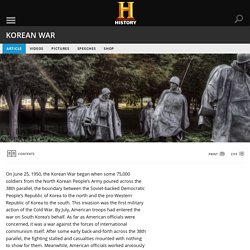
As far as they were concerned, this was not simply a border dispute between two unstable dictatorships on the other side of the globe. Instead, many feared it was the first step in a communist campaign to take over the world. For this reason, nonintervention was not considered an option by many top decision makers. (In fact, in April 1950, a National Security Council report known as NSC-68 had recommended that the United States use military force to “contain” communist expansionism anywhere it seemed to be occurring, “regardless of the intrinsic strategic or economic value of the lands in question.”)
“If we let Korea down,” President Harry Truman (1884-1972) said, “the Soviet[s] will keep right on going and swallow up one [place] after another.” American Experience . MacArthur . Korean Maps. The Korean War Stage 1: North Korea attacks The Korean War began in the predawn darkness of June 25, 1950 as Kim Il Sung's heavily armed and well-trained North Korean army crossed the 38th parallel -- the border between the two Koreas at the end of World War II.
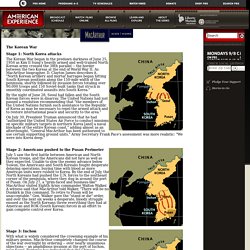
As MacArthur biographer, D. Clayton James describes it, "North Korean artillery and mortar barrages began hitting South Korean positions along the 150-mile width of the peninsula, shortly followed by invasion forces totaling over 90,000 troops and 150 Soviet-built tanks that struck in smoothly coordinated assaults into South Korea. " Experiencing War: The Korean War, Not Forgotten (Stories from the Veterans History Project of the Library of Congress) American Experience . Race for the Superbomb . The Korean War. People & Events The Korean War The Korean War provided the first confrontation between two nuclear powers.
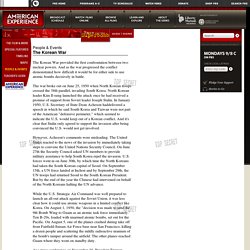
And as the war progressed the conflict demonstrated how difficult it would be for either side to use atomic bombs decisively in battle. The war broke out on June 25, 1950 when North Korean troops crossed the 38th parallel, invading South Korea. North Korean leader Kim Il-sung launched the attack once he had received a promise of support from Soviet leader Joseph Stalin. In January 1950, U.S. However, Acheson's comments were misleading. While the U.S. At a press conference on November 30, President Truman confirmed that he had been actively considering using atomic bombs in Korea since the beginning of the war.
So while President Truman tried to use his atomic superiority to the United States' advantage in North Korea he was never able to. Korean War Fast Facts. Causes of the Korean War:Under Japanese rule before and during World War II, Korea was divided into two parts after the Japanese surrender.
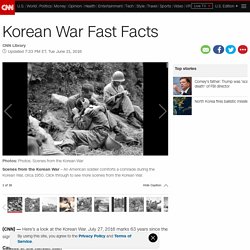
The Soviet Union occupied the area north of the 38th parallel and the United States occupied the area south until 1948. Other Facts:The first war in which the United Nations played a role. When asked to send military aid to South Korea,16 countries sent troops and 41 sent equipment or aid. The Korean War. In 1950, the new Cold War suddenly turned hot when Communist North Korea invaded anticommunist South Korea.

The United States immediately intervened in the conflict by sending combat troops to aid the South. The Americans halted the North Korean advance, then drove the North Koreans into retreat by launching a brilliant amphibious assault far behind enemy lines. By October 1950, it appeared likely that the Americans would not only save South Korea, but liberate North Korea from Communist control as well.
However, just as victory seemed at hand, Communist Red China launched its own surprise intervention, inflicting heavy casualties while driving the Americans back into the South. After 1951, the war settled into a frustrating stalemate along entrenched battle lines not far from the 38th parallel—the same line that had divided North and South Korea before the war began. Nearly 36,000 American soldiers lost their lives in Korea in a war that ultimately ended in a frustrating draw.
Eisenhower Presidential Library. The Korean War After five years of simmering tensions on the Korean peninsula, the Korean War began on June 25, 1950, when the Northern Korean People's Army invaded South Korea in a coordinated general attack at several strategic points along the 38th parallel, the line dividing communist North Korea from the non-communist Republic of Korea in the south.
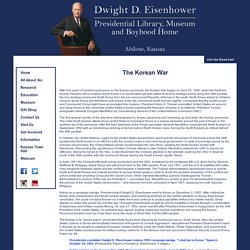
North Korea aimed to militarily conquer South Korea and therefore unify Korea under the communist North Korean regime. Concerned that the Soviet Union and Communist China might have encouraged this invasion, President Harry S. Truman committed United States air, ground, and naval forces to the combined United Nations forces assisting the Republic of Korea in its defense. President Truman designated General Douglas MacArthur as Commanding General of the United Nations Command (UNC).
Military Resources: Korean War. NARA Resources Armistice Agreement for the Restoration of the South Korean State (1953) Text of the armistice that ended the fighting in Korea in 1953.
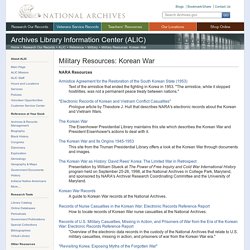
"The armistice, while it stopped hostilities, was not a permanent peace treaty between nations. " "Electronic Records of Korean and Vietnam Conflict Casualties" Prologue article by Theodore J. The Korean War And Its Origins, 1945-1953. May Correspondence Between Frederick Brown Harris and Harry S.
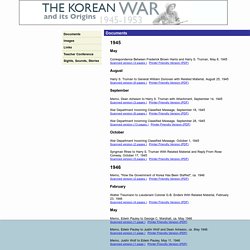
Truman, May 8, 1945 August Harry S. Truman to General William Donovan with Related Material, August 25, 1945 September Memo, Dean Acheson to Harry S. War Department Incoming Classified Message, September 18, 1945 War Department Incoming Classified Message, September 28, 1945 October War Department Incoming Classified Message, October 1, 1945 Syngman Rhee to Harry S. Memo, "How the Government of Korea Has Been Staffed", ca. 1946 February Walter Treumann to Lieutenant Colonel G.B. Memo, Edwin Pauley to George C. Memo, Edwin Pauley to Justin Wolf and Dean Acheson, ca. Memo, Justin Wolf to Edwin Pauley, May 11, 1946 Memo, John Snyder to Harry S. James Forrestal to Harry S. December.